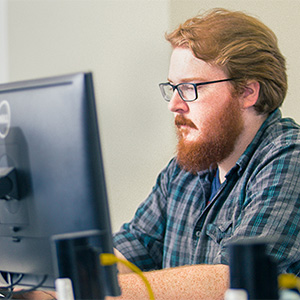Launch Your Software Development Career
Design, implement and maintain software systems with an associate in applied science (AAS) software developer degree at St. Louis Community College. The program covers software architecture, data analysis, web design, software development and database focus areas.
By the time that you graduate from this program, you'll be prepared for industry certifications, entry-level software developer positions or further advanced studies in the field.
What is Software Development at St. Louis Community College?
Software development is the process of designing, programming, testing and maintaining computer software. It involves creating applications, programs and systems to meet user needs, utilizing programming languages and frameworks.
Choose Between Three Career-Focused Tracks
STLCC offers pathways in language, web and database to enable you to pursue in-depth skills and expertise while preparing for industry-recognized certificates.
- Language track includes web scripting technologies, Excel for data analytics, secure e-commerce and multiple Java framework courses.
- Web track include graphics for the web, web scripting technologies, web development and C# frameworks.
- Database track includes SQL and database development, Excel for data analytics, big data analytics and Oracle programming.

What Can You Do with a Software Developer Associate Degree?
Once you complete the software developer associate degree, you'll be prepared for a variety of industry certification exams. You may also pursue entry-level employment as a software developer or programmer, or go on to advanced studies in software design and development.
In the field, you'll be involved in designing, coding, testing and maintaining software applications for IT services, software development companies or technology-focused organizations.
While studying in this program, you'll also have the opportunity to stack additional certificates such as the database developer certificate of proficiency (CP) and web developer certificate of specialization (CS) along the way.
AAS in Software Developer
- Degree offered: Associate in applied science
- Locations: Forest Park, Meramec, Online
- Hours to complete: 61
- Program contact name: Karana Phillips
- Program contact email: kphillips@stlcc.edu
Tuition for district residents is $122 per credit hour for in-district students. Find out more about our straightforward and low-cost tuition structure.
Related Programs
At STLCC, you can combine this degree with a number of certificates to enhance your career opportunities, including:
Why You Should Choose STLCC's Software Developer Program

Schedules Built for Your Busy Life
Fitting a quality education into your busy life is easy with the flexibility STLCC offers, including day and evening classes, in-person and live virtual lectures, as well as online and hybrid options.

Get Hands-On Training with Tech Academy
STLCC's Tech Academy jump-starts tech careers in cybersecurity, software development and network engineering through the support of advisors and faculty coaches. See if you qualify for a free laptop with software, a free industry certification exam, a paid internship, and more.

Build Skills You Need with Stackable Credentials
Stackable credentials help you level up your career opportunities without investing a large amount of time and resources. You can stack or assemble a series of traditional and nontraditional credentials including degrees, certificates, apprenticeships and more.

Graduate With Little or No Debt
We believe cost should never be a barrier to achieving your potential. Save over $4,700 per year with tuition that's one-third lower than other local institutions. Plus, we'll help you navigate scholarship options and financial aid.
STLCC. What's your reason?